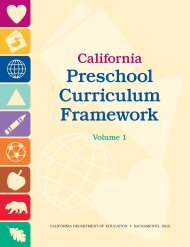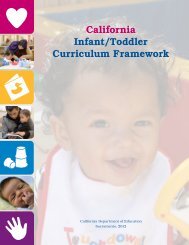California Preschool Learning Foundations - ECEZero2Three ...
California Preschool Learning Foundations - ECEZero2Three ...
California Preschool Learning Foundations - ECEZero2Three ...
You also want an ePaper? Increase the reach of your titles
YUMPU automatically turns print PDFs into web optimized ePapers that Google loves.
LANGUAGE AND LITERACY<br />
58 | Listening and Speaking<br />
1.0 Language Use and Conventions (Continued)<br />
At around 48 months of age At around 60 months of age<br />
1.4 Use language to construct short<br />
narratives that are real or fictional.*<br />
Examples Examples<br />
• The child draws attention or points to pictures on<br />
the wall of a special class event: “The mama bird<br />
built a nest in our toy box. The baby birds flew<br />
away.”<br />
• The child describes an unfolding event at snack<br />
time: “I want to put peanut butter on my bread.<br />
I’m going to put jelly on, too.”<br />
• The child relays events from the day’s morning:<br />
“My daddy’s truck broke down. We walked to<br />
school. It was a long way.”<br />
1.4 Use language to construct extended<br />
narratives that are real or fictional.*<br />
• The child tells a brief story that unfolds over time:<br />
“I went to the park with my mommy, and we<br />
played in the sandbox. Then we had a picnic. After<br />
that, we went to the store.”<br />
• The child tells about activities of interest to him or<br />
her that day: “First we come to school and sit on<br />
the carpet. Then we have our circle time. And then<br />
we do the centers. And then it’s time for lunch.”<br />
• The child retells the major events of a favorite<br />
story: “The boy wrote to the zoo, and they kept<br />
sending him animals. But he doesn’t like them.<br />
So, then he gets a puppy, and he keeps it. He was<br />
happy then.”<br />
* Producing narratives may vary at these ages for children who are communicating with sign language or alternative<br />
communication systems. As is true for all children, teachers can support young children’s communication knowledge and<br />
skills by repeating and extending what children communicate in conversations. Teachers can also provide opportunities for<br />
children to repeat or tell stories as a way to encourage them to produce narratives.<br />
<strong>Preschool</strong> <strong>Learning</strong> <strong>Foundations</strong>, Volume 1 • <strong>California</strong> Department of Education
















